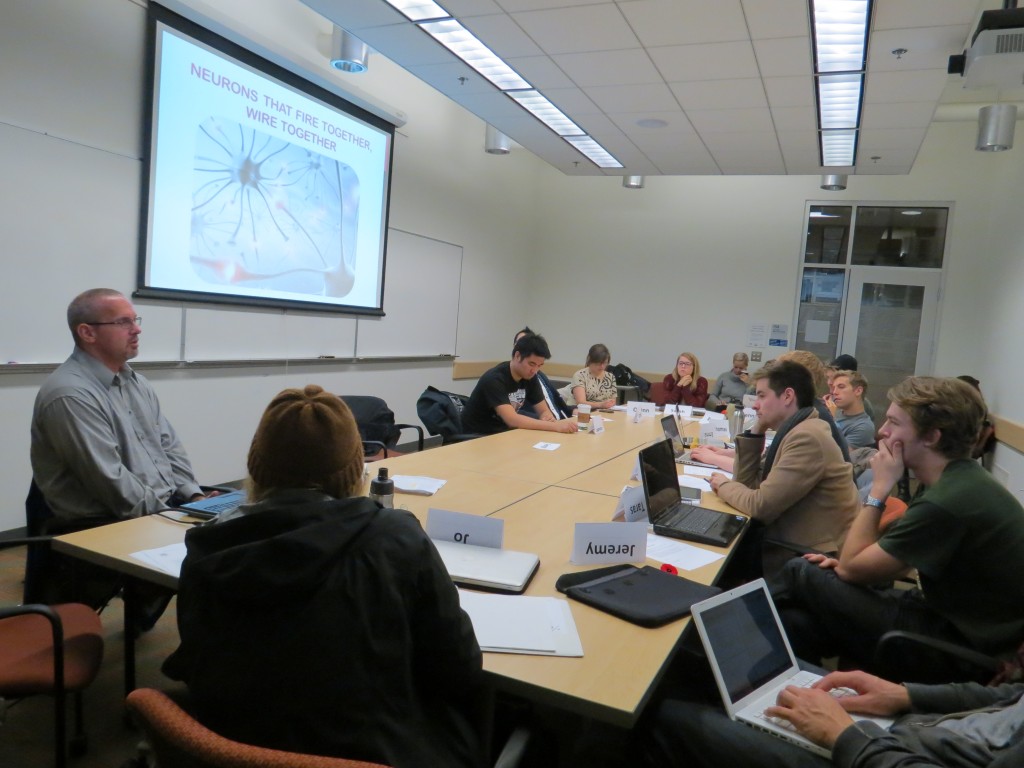Undergraduate students teaching?!
Do I have to pay for the course if I am coordinating?
What kind of credit would I earn?
What are the benefits to coordinating a seminar?
How would I be evaluated?
Do course coordinators complete the same assignments as seminar participants?
Is there a limit on how many of these classes I can take?
Is there a limit on how many times a seminar can be offered at UBC?
How many students can register for a seminar?
Who can become a coordinator?
How can I start up a class?
When do classes run?
When do I apply if I want to coordinate a seminar?
How can I enroll in a seminar?
Where can I get more information?
Undergraduate students teaching?! (Top)
The student coordinator is NOT an instructor. The coordinator’s role is that of a facilitator. S/he is responsible for organizing the learning resources (e.g., guest lectures, reading materials, and films) to be used in the class, and sets the parameters of course content, structure, and evaluation procedures in conjunction with the faculty sponsor. The participants have an important role in refining the details of all of these.
Do I have to pay for the course if I am coordinating? (Top)
Yes!
What kind of credit would I earn? (Top)
You earn upper-level credit, either through the department of the sponsoring professor, or through an interdisciplinary credit option. To find out if this credit can be used to fulfill program requirements (i.e. major/minor credits), make sure to contact the department that ‘hosts’ your program directly.
What are the benefits to coordinating a seminar? (Top)
This innovative learning approach provides coordinators with:
- An opportunity to work more directly with a faculty member
- Valuable facilitation and coordination experience
- Free T.A.G. (Teaching and Academic Growth) training
Course coordination and training are also recognized on coordinators’ transcripts as an additional non-credit item.
How would I be evaluated? (Top)
You may be graded on a pass/fail basis, or according to the standard alpha-numeric scale. The grading system for each course is determined by the faculty sponsor, the coordinator and the participants and applies to both participants and the student coordinator.
Evaluation often consists of two components: participation and completed work. The in-class mark is determined by peer evaluation. Each student’s completed work, which may be a term paper, poster, or some other tangible output, is reviewed either by the faculty sponsor or by peers. Responsibility for assigning final grades to all students, including the coordinator, rests with the faculty sponsor.
Do course coordinators complete the same assignments as seminar participants? (Top)
Yes! Student coordinators must produce the same materials and be evaluated in the same manner as their seminar’s participants.
Is there a limit on how many of these classes I can take? (Top)
You may earn academic credit as a participant in one Student Directed Seminar. Additionally, you may earn credit as a coordinator for one Student Directed Seminar.
Is there a limit on how many times a seminar can be offered at UBC? (Top)
Seminars may only run once. Students who would like to revive a previously-offered seminar will need to clearly demonstrate how the second offering is different in approach, scope, and content.
How many students can register for a seminar? (Top)
The minimum enrolment for each seminar is eight; the maximum is fifteen.
Who can become a coordinator? (Top)
Students in their third year of study or above may qualify to coordinate Student Directed Seminars. Coordinators are selected by the Student Directed Seminars Advisory Committee, based on a course proposal and academic record.
How can I start up a class? (Top)
You must submit a proposal to the Student Directed Seminars Advisory Committee. Your proposal should follow the course design format, and should be approximately 2-3 pages in length. The online application for 2013-14 will be made available in late 2013.
When do classes run? (Top)
While Student Directed Seminars run during both semesters of the academic year, most are offered during the January-April term. September to December (or the summer months for Term 1 seminars) is used to complete coordinator training, order textbooks, prepare syllabi, create reading lists and marking schemes, market seminars, and secure course / room numbers.
When do I apply if I want to coordinate a seminar? (Top)
Applications for the 2013-2014 academic year are now closed. Applications for the 2014-2015 academic year will be made available in late 2013. Proposals will be due at some point at the end of the 2014 Spring semester.
How can I enroll in a class? (Top)
Each course is different. Check-out the descriptions and enrolment procedures at 2013-2014 Seminars Seminars will be listed on the SSC once they are open for registration. Please note that you may be required to submit a statement of interest and provide details regarding your previous coursework, among others, as part of the selection process.
Where can I get more information? (Top)
If you require more information about the Student Directed Seminars program, please contact Tlell Elviss at tlell.elviss@ubc.ca.

